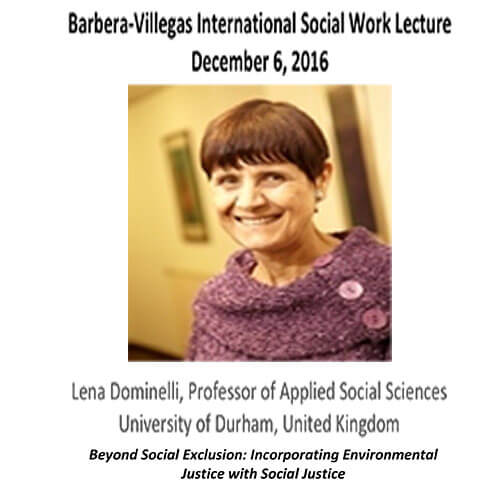
- This event has passed.
Tuesday, Dec. 6, 2016 5:30-7 p.m.
Barbera-Villegas International Social Work Lecture
December 6, 2016
5:30 p.m., Wilson Hall Auditorium
5 p.m., Reception, Wilson Hall Auditorium Lobby

Lena Dominelli, Professor of Applied Social Sciences, University of Durham, United Kingdom
Beyond Social Exclusion: Incorporating Environmental Justice with Social Justice
Lena Dominelli, Professor of Applied Social Sciences and Academician in the Academy of the Learned Societies for Social Sciences, is an experienced educator, practitioner and researcher. Professor Dominelli is also a Co-Director for the Institute of Hazard, Risk and Resilience Research with specific responsibility for the Vulnerability and Resilience Programme. In this latter capacity, she endeavours to bring people together in research dialogues across the physical sciences, social sciences, health sciences, arts and humanities. She is currently also the Chair of the International Association of Schools of Social Work’s (IASSW’s) Committee on Disaster Interventions, Climate Change and Sustainability.
Professor Dominelli argues passionately for the realization of human freedom from social inequalities and injustices in her writings, policy-making forums and communities seeking to change their social and physical environments. Her current research interests include: climate change and environmental social work; globalization; social and community development; social change; women’s well-being and welfare; motherhood; fatherhood; child well-being and children’s rights.
Among Lena’s most recent single authored books are: Social Work in a Globalizing World (2010); Introducing Social Work (2009); Anti-Racist Social Work (2008, 3rd Edn.); Women and Community Action (2006, 2nd Edn.); Social Work: Theory and Practice in a Changing Profession (2004). Key edited works include Social Work: Themes, Issues and Dilemmas (3rd Edn.); Critical Practice in Social Work (2nd Edn.); and Practicing Social Work in a Complex World; (all 3 edited with R Adams and M Payne, 2009); and Broadening Horizons: International Exchanges in Social Work (edited with W Thomas Bernard, 2003).
Lena has received accolades for her contributions to social welfare in the international arena, including a medal from the Social Affairs Committee of the French Senate; and an Honorary Doctorate from the Univeristy of KwaZulu Natal in Durban, South Africa.
Abstract to the Presentation by Professor Dominelli
Wealthy societies are becoming increasingly polarized as wealth is accumulated by a few wealthy individuals, mainly but not all, from the global North, to the detriment of working class children, women, older people, people from black and minority ethnic groups, asylum seekers and refugees. Wealth distribution has become so distorted that Oxfam (2016) has published, An Economy for the 1%, to argue that 62 individuals hold more wealth between them than 50 per cent of the world’s population (3.6 billion people). Moreover, 53 of this super-wealthy elite group are men. According to the Forbes list of billionaires, the world’s richest man (Bill Gates) holds twice the wealth of the richest woman (Christy Walton). Women also hold only 24 Chief Executive Officer (CEO) positions in the Fortune 500 companies. While CEO salaries have become hugely inflated, salaries at the bottom end have remained stagnant or been reduced. For example, American CEOs have seen their salaries increase by 54 per cent since 2009 while salaries at the bottom have not moved. In India, a CEO earns 416 times the salary of the average worker. Women are concentrated in the lowest-paid, most precarious jobs, including dangerous work in the sweatshops of the world. These inequalities have been exacerbated in Europe through what I term ‘state-induced inequalities’ whereby public expenditure cuts and privatized welfare states are becoming the norm, and leading to rising social exclusion and inequality. Discourses about social justice are becoming marginalized, and environmental justice is scarcely considered, including in the post-Paris Agreement world.. The loss of re-distributive transfers through the welfare state mean that more and more people are struggling at society’s margins, merely to survive. Substantial numbers of people rely on food-banks and begging in major, affluent cities like London and Paris, as institutionalized solidarity in the shape of welfare benefits as of right become harder and harder to obtain.
Income inequalities lead to other forms of inequalities, including lost opportunities for the full growth and development of the talents of an individual. The ravages of a neo-liberal industrial model of development produce more losers than winners – the ‘one per cent and the rest’ as the Occupy Wall Street Movement put it. Intervening to prevent its march across the world demands a more sophisticated analysis than is evident to the public which is fed myths by a media that is dominated by right-wingers and right-wing politicians who have appropriated the words of progressive-minded individuals and turned them to their advantage. Such messages have legitimated racist discourses and intensified despair, social protests, loss of solidarity and empathy with those in difficulty, and lack of hope for a future that can deliver basic rights ranging from civic to environmental rights for all peoples living within a particular nation-state. In this presentation, I consider what social workers can do to promote a form of social justice that includes care for people, plants, animals and the planet in meeting human needs.

